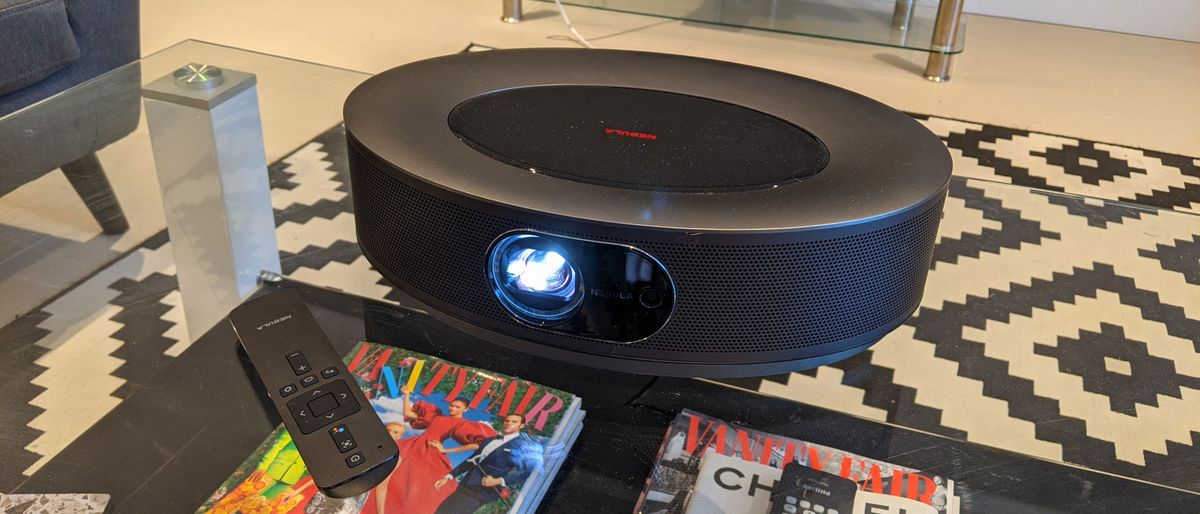

- #Nebula cosmos laser 4k projector 1080p
- #Nebula cosmos laser 4k projector full
- #Nebula cosmos laser 4k projector portable
And the top panel has two LED light options that can be toggled on and off-the red Nebula logo and, fittingly, a field of stars that fade in and out. The dark metallic oval shaped chassis isn't one you immediately want to hide away in its own room. And, while there is a tripod mount point for temporary setup locations, the size and lack of carrying accessories makes the Cosmos a better fit for a permanent place on a shelf or ceiling mount.Īs a general rule, projectors are white or black boxes that don't lend themselves to effusive, lyrical praise on their aesthetics, but Anker has really outdone themselves with the visual design of the Cosmos.
#Nebula cosmos laser 4k projector portable
There is also an excellent 3-second auto focus, which is usually relegated to the portable projector set. (See ProjectorCentral's Anker Cosmos Max Throw Distance Calculator to check the necessary distance for your screen size.) Included is a digital zoom and keystone correction to get the fit just right (although, as always, you should be judicious about engaging these extra adjustments as they can affect image quality and overall brightness). The Cosmos Max is a fixed-lens projector with a throw ratio of 1.2 and can project an image from a 30- to 150-inch diagonal at 2 feet 7 inches up to 13 feet 1 inch. On my sample it didn't seem to be working, or affected the picture minimally at best. Anker advertises a Dynamic Smoothing feature on the Cosmos that presumably does some form of frame interpolation, but there's no way to turn it on or off. There's a toggle in the menu for manually switching it on and off, although there doesn't seem to be a reason to ever have it off. The Cosmos Max supports both HDR10 and HLG.
#Nebula cosmos laser 4k projector full
There are no additional light source modes, such as a full power setting to boost the light output, or a dedicated Eco mode to extend the light source life (30,000 hours is more than enough for the vast majority of us anyway). McNamara's two-part Projector Resolution Shootout.) The RGB LED light source has a life of up to 30,000 hours and Anker claims a light output of 1,500 ANSI lumens, although as shown on the Brightness chart below, I measured about two-thirds of that. (For more information about 4K pixel shifting and an idea of how it compares to native 4K chips, check out Michael J.
#Nebula cosmos laser 4k projector 1080p
Once the Kickstarter ended, its MSRP was $1,800, though now it's MSRP is $1,599 and it has been promoted as low as $1,199.Īnker uses a 0.47-inch DMD DLP chip in the Nebula Cosmos Max that has a native resolution of 1080p (1920x1080) and uses XPR technology to increase the resolution up to 4K. During preorder, the Cosmos Max was available for as low as $1,099 if you got in fast enough. Anker again used the crowdfunding model to step into the 4K market with the Nebula Cosmos Max-a LED projector that uses Texas Instrument's pixel-shifting 4K DLP technology. VAVA's VA-LT002 found its audience through Indiegogo, as did the portable Nebula Capsule II from Anker. The star ratings and Pros/Cons above, as well as the review that follows, have been updated by our original reviewer John Higgins to reflect the latest version of the projector and supersede any earlier comments.-Rob Sabinīeyond the games, gadgets, films, and headphones that have secured their funding through Kickstarter and Indiegogo, companies have used the crowdfunding platforms as a way to drum up interest for new projectors and allow us all to preorder the products. Nonetheless, the image quality has improved noticeably and the projector's value quotient has gone up thanks to lower pricing. While the revised Cosmos Max is more than 200 ANSI lumens brighter than the original, with 943 measured lumens, it still falls short of the 1,200-lumen threshold allowable for a projector with its published 1,500 lumen spec (we measured 943 lumens). Temporary holiday promotion has made it available on the Nebula website for $1,399 and it has been seen elsewhere for as little as $1,199. They also reduced the price from $1,899 MSRP/$1,699 street to a MSRP/street price of $1,599.

In the interim, Anker updated firmware to address a number of issues, including measured brightness that fell well short of its published ANSI lumens spec and a blue-leaning grayscale in all picture modes that could not be calibrated for reasonable accuracy to production industry color standards.

Anker has spent the past year making improvements to (and dropping the price of) the Nebula Cosmos Max, which makes it more competitive in its price range.Įditor's Note: Our initial review of the Anker Cosmos Max 4K projector was published in January 2021, nearly a year ago.


 0 kommentar(er)
0 kommentar(er)
